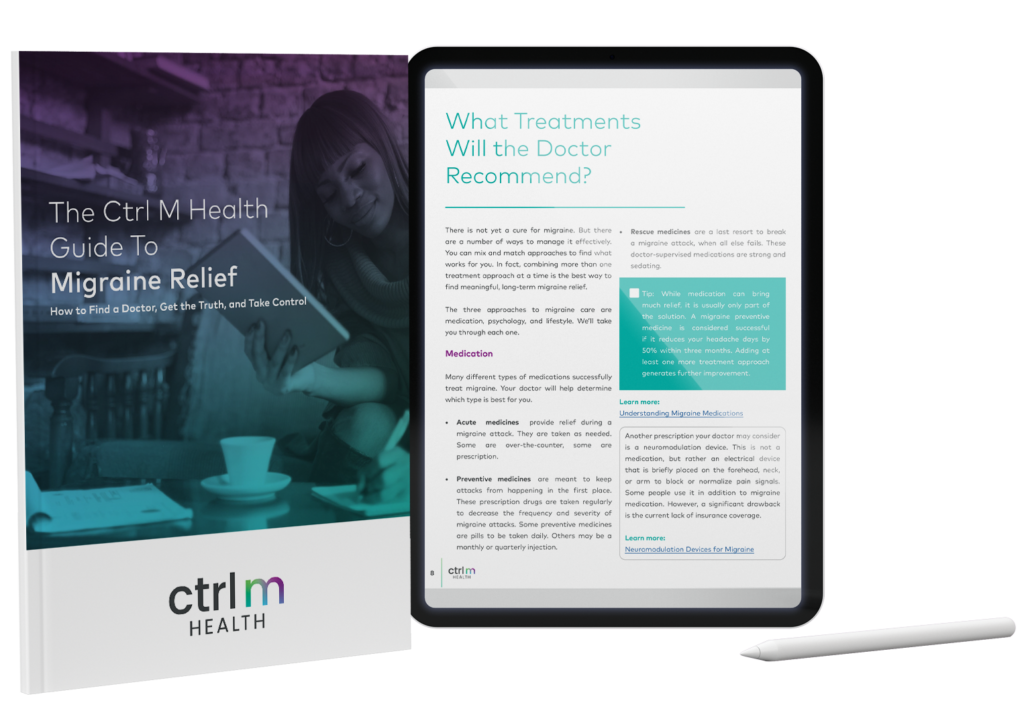Maybe you’re worried about when your next migraine attack is coming. Maybe you’re anxious about this month’s rent, or a situation at work, or an argument with someone. Whatever the source, life’s stresses have a way of piling up fast. For people with migraine, the result is an attack. Eighty percent of people with migraine report stress as a migraine trigger. Beyond being terribly triggering, stress presents further risks for people with migraine:
-
- Stress makes migraine attacks worse and harder to treat.
- Chronic stress puts people at risk for their episodic migraine (less than 15 days per month) turning into chronic migraine (15 days per month or more), a condition far harder to treat.
Stress may be bad for us, but it’s hard to avoid. Fortunately, there are plenty of ways to manage it to promote calm and well-being, and start improving migraine.
The Migraine Brain Under Stress
Our stress response is better known as our “fight or flight” response. When our bodies sense danger, we’re pre-programmed to take quick action with surges of adrenaline and stress hormones such as cortisol. The nervous system revs up, the dopamine and endorphins flow, all so we have the energy to make it out of an emergency alive.

This biochemical shift is dramatic for everyone, but it’s a real roller-coaster for the hyper-sensitive migraine brain, which tends to overreact to changes in its environment. In addition, when we live in a state of near-constant high alert, we put undue stress on the brain and our body’s systems. People with migraine have a harder time turning off that alarm bell in their brain. The resulting stress creates a stronger and longer-lasting ripple effect across the body’s systems.
Interestingly enough, people with migraine may also perceive events as more stressful than others, even when presented with the same situation. This predisposition often puts the person with migraine on a higher state of alert more often. This affects other parts of well-being, because stress can lead to inconsistent sleep, poor food choices, muscle tightening in the neck and shoulders, higher blood pressure, and so on. Chronic stress is also believed to alter our immune system and cause changes in brain structure so that the brain is even less able to tolerate stress, all of which add up to make a person more susceptible to a migraine attack.
Stress Management for Migraine
The power of the mind to affect the body is absolutely clear. You may not be able to control the stresses in your life, but you can take action to dial down your responses to stressful events, and learn to counterbalance stress.
Behavioral therapies. Mindfulness, meditation and relaxation techniques such as biofeedback can have amazing results to calm down the brain and manage stress, and with no side effects. Some studies show combining some of these can be particularly effective. Talk therapy can also be excellent to help pinpoint triggers in your emotional life, understand why they hold power over your well-being, and help you develop long term coping skills to mitigate the fallout.
Exercise. Yoga, running, tennis, cycling or any of your favorite physical activities can help unwind the aggravated mind. Exercise can unlock clenched muscles, relax neck, shoulder, and hip muscles, and generate “feel-good” signals in the brain and body. Make sure to give yourself time to warm up and cool down in addition to the time you spend actively exercising.
Medications. Antidepressants and anti-anxiety medicine can be quite effective in reducing stress. And when these medicines are combined with behavioral therapies, they are effective in retraining the response to stress.
Social support. Though socializing can be difficult with migraine, humans are naturally social creatures. Around others, we tend to relax, our shoulders drop, we laugh, breathe more deeply, and release beneficial hormones. Connecting with other people eases our stress.
Stress is unavoidable, but there are a lot of strategies we can use to make it less activating to our emotions and bodies. Self-care is important for those with migraine. By incorporating reliable stress-busting skills into our daily routines, we can reduce the chance of it contributing to the next attack.
The Care Tuner Guide to Migraine Relief
Untreated migraine tends to worsen over time, so if you suspect you have migraine, it’s important to get help. We’ve compiled everything you need, including what to expect, pitfalls to avoid, and what you can do right now to get relief.

Learn some helpful stress-reduction strategies in this article? Find out how to put them to use in your daily life with “The 4-Step Guide to Stress Management for Migraine.”





